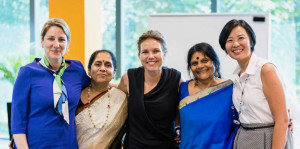Inequality is one of the by-products of our fractured world. With polarized politicians struggling to solve the problem, technology could provide a long-term solution.
Organisations ranging from the World Bank to Oxfam have found that, despite the progress made in earlier decades, global income and wealth inequality remains stubbornly high.
Other forms of inequality are equally persistent - gender and racial pay gaps continue to cause concern and are acknowledged even more widely.
However, it can seem that the tools of politics are no longer up to the task of resolving these tensions between different groups of people in society.
Democracy has traditionally been able to bring together different stakeholders, resolve or reduce differences, and allocate a nation’s resources among the population. An increasingly divided political landscape makes this harder.
Politicians with more extreme views are winning seats in legislatures, and even the mainstream parties in countries like the US and the UK are at odds to an unusual extent.
Persistent inequality is not only an outcome, but also a cause, of this polarisation. The vicious cycle continues.
Disrupting inequality with tech
Digital technology is often described as ‘disruptive’. What if it could disrupt not just the market for taxis or food delivery, but the entrenched structural problems of society itself?
A new generation of technology is starting to do just that.
Experimental economists, epidemiologists, computer scientists, psychologists and cognitive scientists are all working on ways to build digital models of society. These models help us understand how social problems arise and let us invent and test new solutions.
The Euristica project that I work on is an example. Euristica is a simulated miniature population of 100 people, living on an isolated island. The software behind Euristica is called an agent-based model, and is built on the insights of cognitive and behavioural economics.
It simulates how people make decisions when faced with real-world dilemmas. It allows different social and economic questions to be explored – investment and economic growth, the adoption of new technology, and the discrimination and prejudice that many people face in the workplace.
Unearthing a world of possibilities
Euristica’s cognitive technology has made some significant discoveries. It has shown how historical inequalities can remain entrenched even if people no longer have the prejudices that led to them; that the gender pay gap will still be with us in 50 years if we don’t act now; and that an ‘unconscious bias’ exists among employers (something that Tata Consultancy Services’ Ritu Anand has expanded on).
Most importantly, Euristica allowed me to test a dozen different solutions to the gender and racial pay gaps.
Some solutions helped reduce the 22% gap between men and women by five or 10 percentage points; some didn’t work at all. But Euristica found one approach that would close the entire gap - identifying the positive value of diversity to a company, and paying higher salaries to achieve it.
The next challenge for Euristica involves society-wide income and wealth inequality. Several questions arise from this: What impact does it have on happiness and life outcomes? If it is addressed, will this help or hurt economic growth? How does it interact with other dimensions of inequality?
A pain-free testing ground for social dilemmas
Euristica, and other agent-based models like it, have the potential to help us understand and solve many more social dilemmas. We may never again have to use society itself as a laboratory for new, untested solutions.
Agent-based models can be our testbed. If something doesn’t work, simply push the reset button and try again, at little or no cost, with no permanent effects and no lives ruined.
It’s important to state, however, that technology solutions won’t, and shouldn’t, entirely replace the emotive, intuitive, human processes of political argument and decision making.
Digital algorithms are still evolving too fast for us to fully understand their power and social impact. But digital technology can be an amazing way to get evidence-based answers to some questions that we often find hard to think about objectively – and to solve some intractable arguments that risk further fracturing our already divided world.


